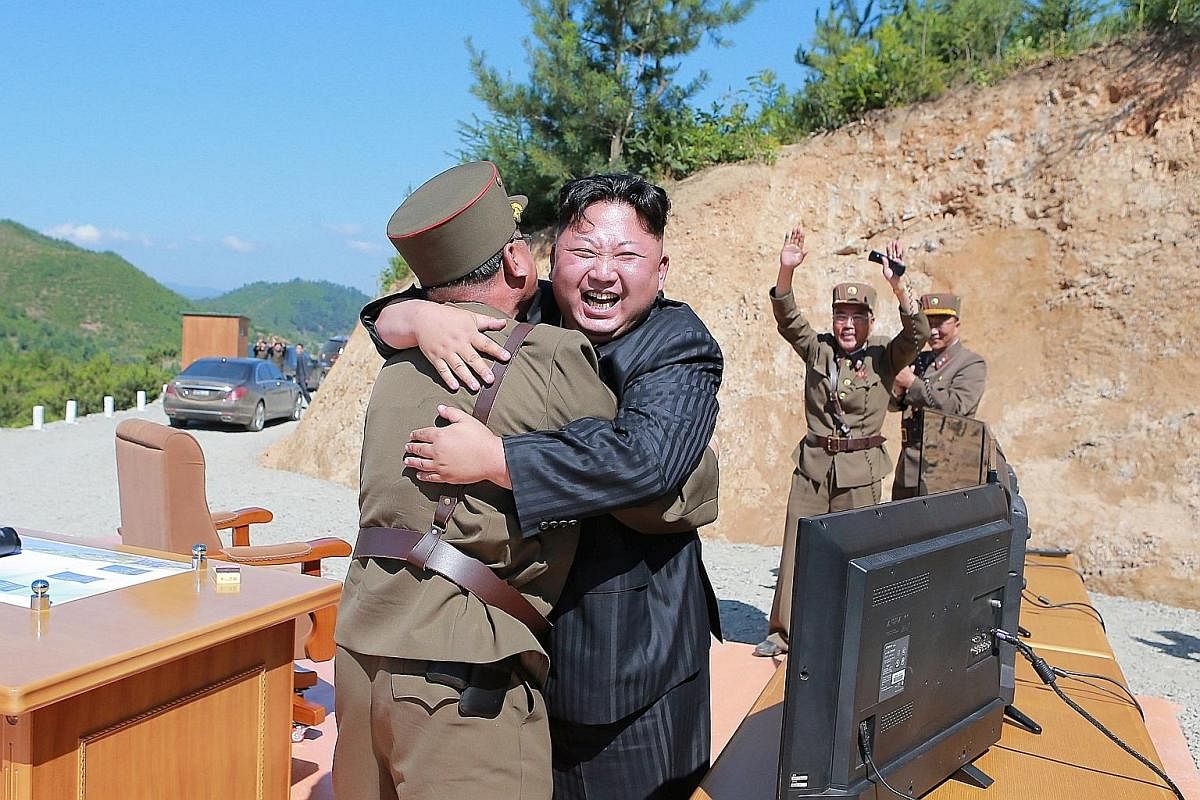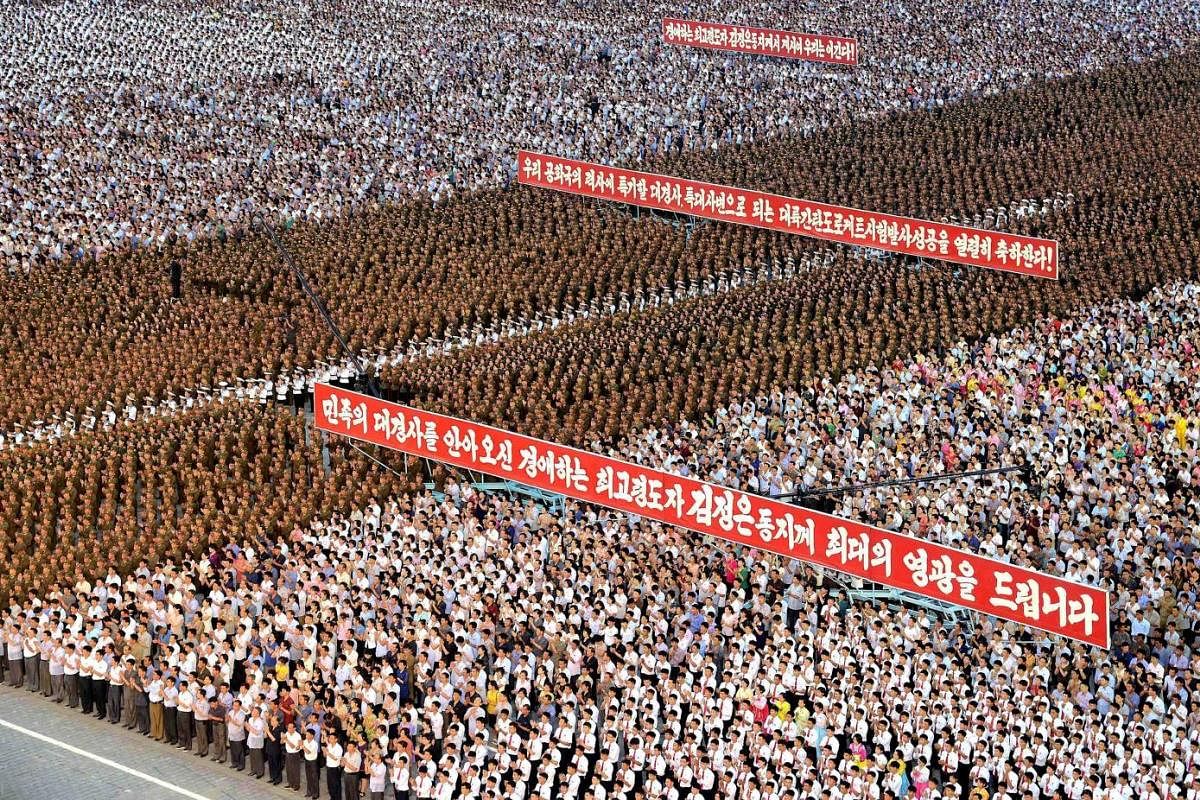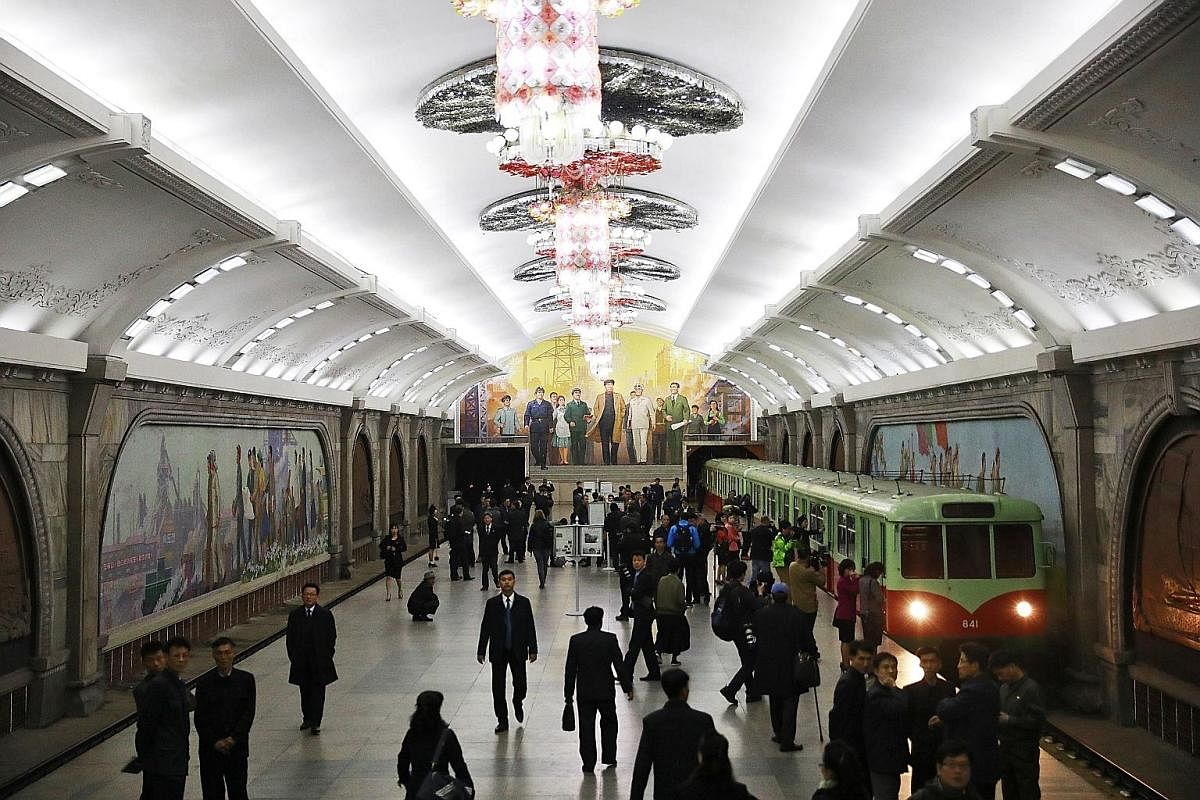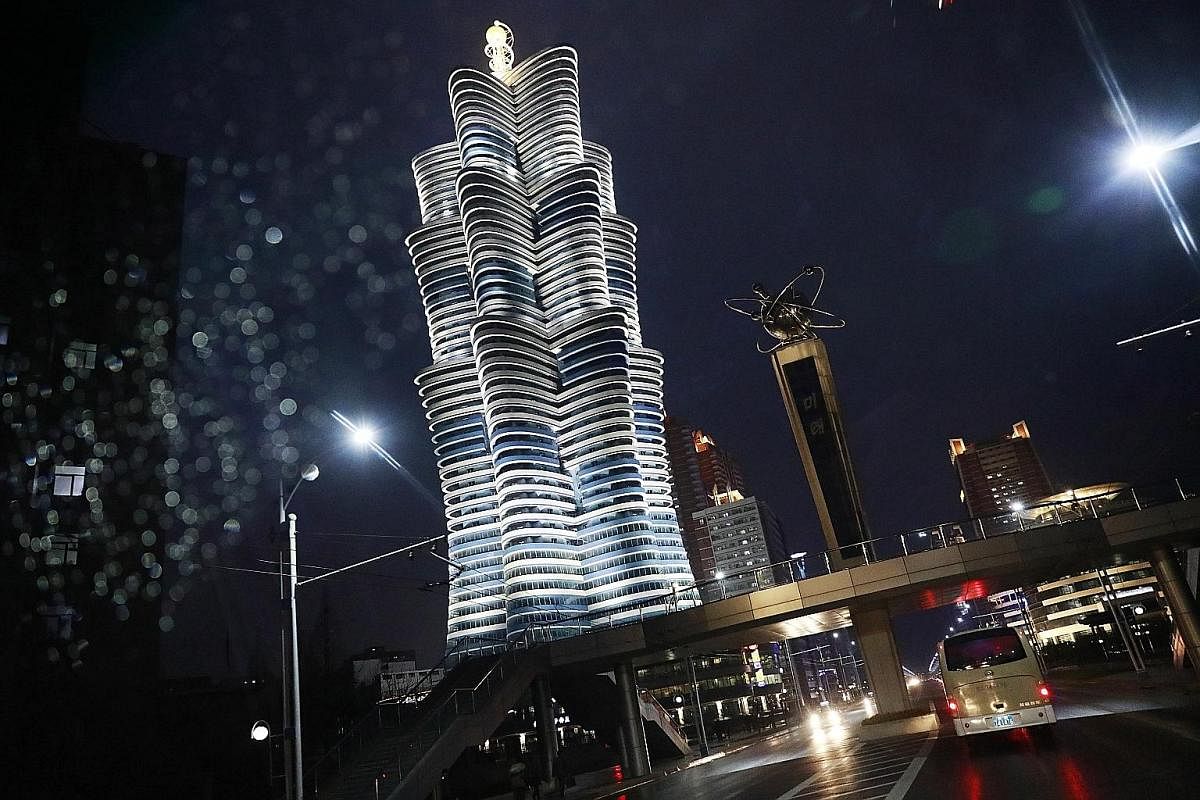-
Foreign-sourced expertise
The fact that North Korea's weapons programme has been able to continue unabated is a legacy of the Cold War and, by and large, due to external influences, analysts said.
Dr Katsuhisa Furukawa, a former United Nations expert monitoring UN sanctions against the North, said: "Since the Cold War, North Korea has been known for its relatively impressive ability to reverse-engineer the foreign-sourced items and technologies, especially those from the former Soviet Union states."
This extends to building centrifuges and Pyongyang today is self-sufficient in its stockpile of uranium and plutonium reserves that are reportedly enough for at least 20 nuclear bombs.
It has conducted five nuclear tests thus far, including two last year. The fifth test last September produced a blast that, according some estimates, was more powerful than the atomic bomb that flattened Hiroshima in 1945.
Satellite images have shown that the North might be gearing up for a sixth test by excavating a tunnel at its test site that can withstand an explosive force up to 14 times more powerful than the previous test.
Analysts also said the North's apparent willy-nilly approach to testing missiles indicates that it has many more in its arsenal.
Experts have pointed out similarities between the intercontinental ballistic missile launched last week and the equipment used by Russia at the end of the Cold War.
Dr Furukawa said North Korea has been systematically collecting information and has developed advanced science and technologies from all over the world since the Cold War era - including scientists and engineers who have acquired advanced skills and expertise through their residence abroad.
It is unknown how many countries still receive researchers from North Korea today, he said. But at least until recent years, the North has "systematically dispatched researchers, scientists and students to foreign institutions in the fields relevant to nuclear and ballistic missile programmes, including in Russia, India, and Italy".
Dr Bong Young Shik from Yonsei University's Institute for North Korean Studies told The Straits Times that the basic model of North Korean missiles came from Iran, while the more recent technology hailed from China.
Security analyst Li Mingjiang from the S. Rajaratnam School of International Studies at Singapore's Nanyang Technological University, too, noted the close contacts that North Korea has with Iran and Pakistan.
While there has been no clear evidence to indicate so, Dr Narushige Michishita from the National Graduate Institute for Policy Studies in Tokyo said the rapid advancements suggest the outsize role of foreign influence. He said sympathisers from China and Russia were, perhaps, "the biggest suspects".
World Focus
Why UN sanctions fail to tame North Korean menace
The country skilfully circumvents laws to enrich itself




The United Nations (UN) has imposed six sets of sanctions against North Korea since its first nuclear test in 2006, but these have failed to stop the isolated state from pursuing its missile weapons programme.
Last Tuesday, Pyongyang raised the stakes when it test-fired an intercontinental ballistic missile (ICBM) for the first time that places Alaska within its crosshairs. North Korean leader Kim Jong Un, 33, said the test completed his country's strategic weapons capability that includes atomic and hydrogen bombs, said the state news agency.
UN sanctions thus far have taken aim at money transfers as well as trade of minerals and rare earth metals. But despite being strengthened each time the North acts up, the UN sanctions lacked bite.
The North not only has nascent market forces, but has also cultivated its own research and development (R&D) programme that experts say is often underestimated. In a sign of the sophistication of North Korea's R&D, Pyongyang has sold a US$6 million (S$8.3 million) air defence system to Mozambique, and guided rockets and aerial missiles to Sudan, a UN report in February said.
North Korea also engages in a web of skulduggery that lets it tap on black markets and shell companies to move money, people and goods across borders, said the UN report.
The North, long perceived as impoverished, in reality has built up a self-generating economy that benefits its wealthy. In April, Pyongyang flaunted a luxury housing complex, while its small but affluent nouveau riche are reportedly brandishing smartphones and luxury items.
This is significant, analysts said, as it indicates a self-sustaining economy able to channel funds into its R&D for the missile and nuclear programme, ostensibly at the expense of impoverished North Koreans.

Data on the North Korean economy is scant, but the New York Times reported in April that estimates of its annual growth range between 1 and 5 per cent.
China, meanwhile, accounts for at least 90 per cent of North Korean trade and is thus a key pillar of the isolated state's economy. Bilateral trade grew by nearly 40 per cent in the first quarter of the year over the same period last year, United States President Donald Trump said last Wednesday.
Beijing has long been lambasted for not doing enough to rein in Pyongyang, but has insisted it is strictly implementing the UN-imposed sanctions that it, too, has been voting to pass.
In February, China said it would halt coal imports from Pyongyang for the rest of the year. UN sanctions have only set an annual ceiling on the import of coal from North Korea, but this excludes shipments deemed to be "exclusively for the livelihood purposes of (North Koreans) and unrelated to generating revenue for (its) nuclear or ballistic missile programme".
Indeed, Dr Katsuhisa Furukawa, a former UN expert monitoring sanctions against the North, pointed out that trade with the North as a whole is not banned by the UN Security Council. "It is targeted sanctions aimed at preventing the movement of people, goods, technologies and funds related to weaponry, with a minor addition of luxury goods."
Trade continues unencumbered between China and North Korea, and trucks were seen last week in the border Dandong city lining up bumper to bumper along the Sino-Korean Friendship Bridge across the Yalu River.
-
90%
Percentage of North Korean trade accounted for by China, which makes it a key pillar of the isolated state's economy.
-
US$6t
Value of precious metal stockpiles that North Korea is reportedly sitting on, although it remains unclear how much of this is being exported.
The sanctions have not hindered the North's economy from becoming a "self-generating beast", as described by Ms Anwita Basu, consultant analyst for North Korea at the London-based Economist Intelligence Unit. She told The Straits Times: "As contrarian as this may sound, one has got to realise the possibility of existence and prosperity without depending on the West, and without being a capitalist neo-liberal economy."
More ominously, the North also stands accused of more illegitimate means to evade sanctions. The UN report accuses Pyongyang of adopting fake business aliases and disguising ships with foreign flags. Last year, Egypt intercepted the vessel Jie Shun, which was captained by a North Korean and sailed under a Cambodian flag. Cambodia has since delisted the ship.
Whether covertly or overtly, countries such as China and Russia, and regions such as South-east Asia, Africa and the Middle East have been used as conduits, said experts. Cash cows include the illicit drug trade in South-east Asia and arms trade with sub-Saharan Africa.
North Korea, too, reportedly sits on an array of precious metal stockpiles worth US$6 trillion by some estimates, although it remains unclear how much of this is being exported.
Another area through which the North has been said to enrich itself is cyber warfare. It was blamed for unleashing the WannaCry virus that infected more than 300,000 computers in over 150 countries in May. Pyongyang was also accused of siphoning US$81 million from the Bangladeshi account at the New York Federal Reserve last year.
Besides China, North Korea has trade relations with Russia. The two countries have signed deals to increase bilateral trade to US$1 billion by 2020 and build a railway connecting the Russian border to Rajin in North Korea. In May, a regular ferry service began plying between Vladivostok, in Russia, and Rajin.
The North has, over the years, devised myriad ways to circumvent the sanctions amid the many legitimate avenues it has. And this applies to how it obtains technology and expertise for its missile and nuclear ambitions. North Korea has been "professional in concealing illicit transactions within legitimate ones", Dr Furukawa said. It may import commercially available computer items and machine tools with parts that could be applied to its nuclear programme, he said.
North Korea appeared to have used a Chinese truck, originally sold for hauling timber, to transport and erect the ICBM that was test launched last Tuesday.
"It is a mistake to think that this is really a hermit kingdom that is cut off and doesn't have access to the Internet," said Mr David Cohen, a former deputy director of the US Central Intelligence Agency, as quoted by Washington Post. "They have a lot of disadvantages, but the biggest part of the government economy is their nuclear and missiles programme, so the smartest folks they have are directed to do this work."
•Additional reporting by Goh Sui Noi in Beijing and Chang May Choon in Seoul
Join ST's Telegram channel and get the latest breaking news delivered to you.
A version of this article appeared in the print edition of The Straits Times on July 11, 2017, with the headline Why UN sanctions failed to stop North Korea's nuclear and missile programme. Subscribe
